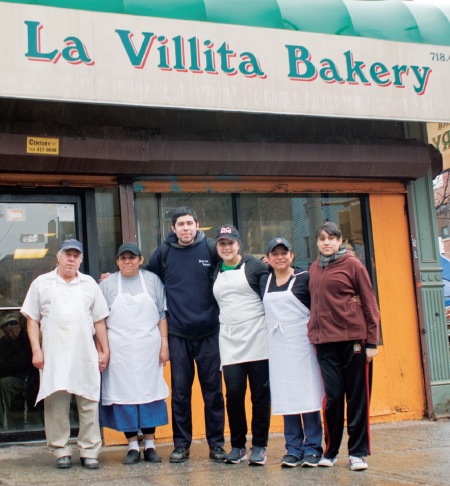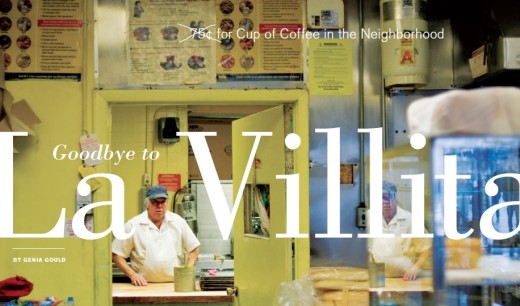The birthday and wedding cakes in the La Villita Bakery window would turn brown over time, and with figurines of bare-breasted mermaids and muscular men, the result was camp (which most in the neighborhood appreciated, or some piqued by). The cakes were made of styrofoam but decorated with meringue and sweet cream. White-haired Alfonso Sosa, the owner of La Villita for 17 years, said he replaced the prop cakes with fresh ones every six months or so.
Patricia Meza, Alfonso’s wife, would be at the grill making egg sandwiches with generous portions of bacon tucked into the fresh breads or croissants made on the premises. Sosa’s sister-in-law, Maribel Meza, an outgoing woman, employed at the bakery for 13 years, managed the customers, took orders, and worked the cash register. My guess is Maribel was teaching Spanish to several dozen regulars, including myself, in short exchanges while buying coffee, pastries, and sandwiches. “I love to talk with people, and to be in the front of the shop,” she said, revealing her ideal job description, as she’ll need a new one soon. Her people skills were widely known and already new job offers are in the works.

Alfonso with wife Patricia Meza, son Alfonso, Jr., daughter Patricia, sister-in-law Maribel Meza, and daughter Alma.
The glass display cases featured over 40 different kinds of pastries, including cheese and cinnamon danish, el pan de mais, banana cake, carrot cake, pan Mexicano, borrachos, conchas and cookies, pound cake, you name it, and don’t forget the 35 cent sugared donuts which put Dunkin’ Donuts to shame.
Every day Alfonso would be in the back work area, at a large table, with a door open, so one could see him shaping and kneading dough for pastries and breads and placing them onto multiple pans. His croissants rivaled the French ones, said many patrons. “It was the butter,” said Maribel, “the croissants are crispy and rich, not too fluffy or full of air.” A testament to the croissants was one customer, who travelled to the neighborhood bakery from Manhattan for ten years:” She would buy seven croissants, one for every day of the week,” said Alfonso.
The bakery, with its low prices and relaxed atmosphere, was a haven for babysitters, office cleaners, and construction workers, explained Maribel. “Sometimes babysitters would come in three times a day for a tea.”

Display cakes in La Villita Bakery were made of styrofoam and meringue.
We won’t be seeing those artful cakes in the window anymore. You won’t have the opportunity to try their croissants. We won’t be seeing Alfonso making bread and pastries in the back, and our Spanish lessons with Maribel are cut short. The reason is that in January the building’s landlord doubled the rent, from $5,000 to a whopping $10,000 making it impossible for Sosa to renew the lease. Adding insult to injury even though they agreed to leave, the landlord (not their original landlord) harassed them until the day they left. He attempted to wrangle from them all the equipment in the store, including a prized, old-fashioned dough mixer. On their last day, the community came to say goodbye throughout the day, and relatives came from Mexico to be of assistance.
On February 28, they packed up all their belongings and every last piece of equipment into a truck, and drove it to Wilkes-Barre, PA where Mr. Sosa, his wife and children, are setting up a new life, and another bakery. They were able to fall back on a small property they own there, where Sosa once had a bar, also called La Villita. He closed the bar to set up the bakery which will have a new name. It’s a new chapter in their lives.
The couple had no intention of leaving the neighborhood. Their lives were good in Williamsburg, the bakery was thriving. They raised three children here, all of whom went to the local schools. Alfonso is originally from a village in Mexico called Santana Tecolapa. When he came to the States as a young man, he worked at restaurants and other local bakeries, and eventually was hired at the same bakery he now owns. After many years of apprenticing, he took over the business when the owner decided to sell, 17 years ago. He has since woken up every day at 3 or 4 in the morning to bake, staying until 6 or 7 at night.
The reason, he says, he kept the door open in the baking area was, “I wanted my customers to see that it was clean, that everything was freshly baked, and mostly, so they could see that I loved what I was doing.”
When neighborhoods don’t have choices about the price of a cup of coffee or how much to spend for breakfast, and everything becomes the same, then the neighborhood becomes less interesting and less vibrant. Our fantasy for La Villita is that they come back, even if it’s in a food truck.

Leave a Reply